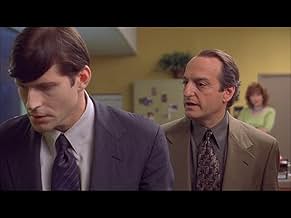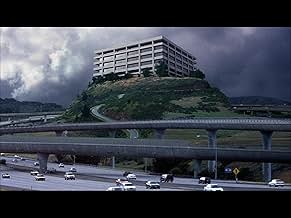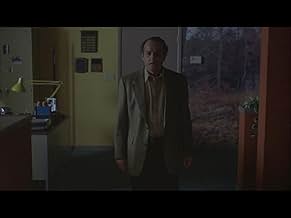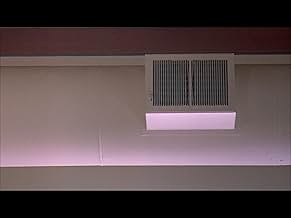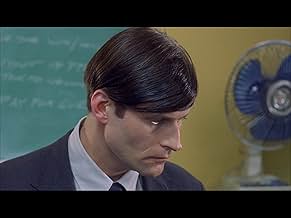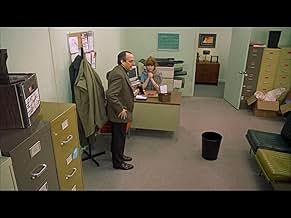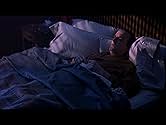IMDb-BEWERTUNG
6,4/10
2303
IHRE BEWERTUNG
Füge eine Handlung in deiner Sprache hinzuA clueless boss has no idea what to do with his mundane office worker whose refusal of duties only gets worse each passing minute.A clueless boss has no idea what to do with his mundane office worker whose refusal of duties only gets worse each passing minute.A clueless boss has no idea what to do with his mundane office worker whose refusal of duties only gets worse each passing minute.
- Regie
- Drehbuch
- Hauptbesetzung
- Auszeichnungen
- 1 Nominierung insgesamt
Stu Klitsner
- Professor Bum
- (as Stuart Klitsner)
Catherine DiNapoli
- Rocky's Girlfriend
- (as Catherine di Napoli)
Empfohlene Bewertungen
Herman Melville's short story "Bartleby the Scrivener" gets a slightly surreal update in this offbeat comedy drama. The manager (David Paymer) of the city records department in a mid-sized California community decides that his staff of three - flirty chatterbox Vivian (Glenne Headly), sloppy Vietnam vet Ernie (Maury Chaykin), and slick-suited, Don Juan wannabe Rocky (Joe Piscopo) - could use some help, so he places an ad looking for a new employee. The boss ends up hiring the one and only applicant who wants the position, a quiet, pale young man named Bartleby (Crispin Glover).
At first, Bartleby is a model of efficiency, but before long he loses enthusiasm for his job, much to the annoyance of his co-workers, and soon he's spending his days staring at an air conditioning vent. The Boss asks Bartleby to get back to work, but Bartleby's repeated reply to such requests is, "I prefer not to," and the Boss sees little recourse but to fire him.
However, Bartleby refuses to leave his desk, and it soon becomes obvious that Bartleby has not only stopped doing his work - he's stopped going home and has moved into the office. Bartleby was the first feature film for producer/director Parker. He also wrote the screenplay, in collaboration with Catherine Di Napoli.
There is really not enough material in Melville's story to warrant a feature length film. When "Bartleby" sticks to the text of the story it is interesting and fairly funny, but Parker is forced to add a lot of filler which is simply not very good. Worth a look, but in the end, a bit weak.
At first, Bartleby is a model of efficiency, but before long he loses enthusiasm for his job, much to the annoyance of his co-workers, and soon he's spending his days staring at an air conditioning vent. The Boss asks Bartleby to get back to work, but Bartleby's repeated reply to such requests is, "I prefer not to," and the Boss sees little recourse but to fire him.
However, Bartleby refuses to leave his desk, and it soon becomes obvious that Bartleby has not only stopped doing his work - he's stopped going home and has moved into the office. Bartleby was the first feature film for producer/director Parker. He also wrote the screenplay, in collaboration with Catherine Di Napoli.
There is really not enough material in Melville's story to warrant a feature length film. When "Bartleby" sticks to the text of the story it is interesting and fairly funny, but Parker is forced to add a lot of filler which is simply not very good. Worth a look, but in the end, a bit weak.
Don't know if Melville would even recognize his marvelous short story as translated into this film, or even if he'd approve...although I think he might...because the spirit of the original is here.
The satire of office shenanigans as presented by Jonathan Parker brings humor to this rather sad tale of a man determined to bring his intransigent self to the workplace and even to life itself... in the extreme. The overall effect is humane and even when the laughter comes we know something poignant is going on. David Paymer is superb as the frustrated, distraught but empathetic boss who tries to get Bartleby to be a responsive, reasonable worker/person, to no avail. Crispin Glover is a rather ghostly looking Bartleby, in a performance that demands withholding, a difficult task, but one he meets quite well.
This is good entertainment and food for thought...not often the case in movies these days.
The satire of office shenanigans as presented by Jonathan Parker brings humor to this rather sad tale of a man determined to bring his intransigent self to the workplace and even to life itself... in the extreme. The overall effect is humane and even when the laughter comes we know something poignant is going on. David Paymer is superb as the frustrated, distraught but empathetic boss who tries to get Bartleby to be a responsive, reasonable worker/person, to no avail. Crispin Glover is a rather ghostly looking Bartleby, in a performance that demands withholding, a difficult task, but one he meets quite well.
This is good entertainment and food for thought...not often the case in movies these days.
I loved this film and I cannot believe how so few critics liked it. What were they thinking? Apparently one critic thought since it was based on a short story that the film should be shorter. Of course, once one critic says its too long, every other critic has to agree. I guess David Mamet is an exception to the rule. Bartleby is not too long. It deserves it's running time so that we can absorb the story more closely. When we hear Bartleby repeat the same words: "I'd prefer not to" we are not given any explanation for the comment but yet it becomes extremely poignant. Eventually everyone in the office begins to use the word "prefer" and we see how Bartleby has affected the workplace like a disease. The film is very bizarre particularly because of the way the boss reacts to Bartleby. Instead of just firing the guy for not doing his job, he tries to reason with him. Eventually Barlteby gets in an even more bizarre predicament that has even more to do with just "prefering not to" work. The boss is obsessed with Bartleby and the film turns very Kafkaesque. We see a capitalist scenario where people topple on another for greed, power and respect. The film is based on the short story "Bartleby the Scrivener" by Herman Melville. It was appropriate to mention the source because the story seems very relevant not only to our modern culture but also to what Melville went after writing Moby Dick. The film also has a wonderful score with a Theramin instrument and a brilliant cinematography.
Ordinarily when the industry tries to turn a short story like Melville's "Bartleby the Scrivener" (which I haven't read since high school) into a "major motion picture," you can forget about it. The kiss of death. You want to see an example, watch Hollywood's version of "The Snows of Kilimanjaro" sometime, especially the scene in which Gregory Peck receives a message -- that famous floating pregnant italicized first paragraph of Hemingway's -- and reads it aloud between guffaws in a smokey saloon midway through the film.
I wasn't expecting much from this movie either. It has less action than Hemingway so I was prepared to switch channels on impulse. But I was surprised because it turned out to be very well done. Melville is often cited as a forbear of Kafka but I don't know how well deserved that description is. The fact is that after Melville and before Kafka there was an enormous interest in bureaucratization, the "rationality" of labor as Max Weber referred to it. It was the period in which small craftsmen were being replaced by the kind of gigantic corporations that "alienated" the worker. Henry Ford adopted Jackson's "assembly line" methods and -- well, you get the picture. Bureaucracy, as a social problem and as a literary subject, was in the air. Anyway there's a little touch of Ionesco in here too, in addition to Kafka.
Wardrobe is great. Everyone's dress reflects his or her personality but not in any obvious way. Art direction is equally well done. The acting could hardly be improved upon and the script is surprisingly well joined. The latter two points are important because this is hardly more than a staged play and is very dependent on those aspects of production. And, oh, I have to mention the score too. Most of the music is a tinkling solo piano straight out of a silent movie. The rest is most queerly orchestrated: percussion, piano, bowed bass, theramin, trombone and vibes. (It's as if someone had thrown the name of every possible instrument into a hat including the glockenspiel and drawn out half a dozen at random.)
There isn't space enough to get into the rewards this film offers but let me mention two anyway. The performances are fine, but Glenn Headly is outstanding with her hooded eyelids and her gaze which seems to drop unzippingly down a man's body when she speaks to him. Her voice is sultry, mellifluous, insinuating. And her posture! Well, it's easy to get laughs out of a funny walk. Monty Python built a sketch around the idea. But Headly's BELONGS to her character. Her pelvis and belly are thrust forward, her shoulders drawn back, a Venus of Willendorf minus two hundred and fifty pounds.
The script -- except for an overblown plea for something called "humanity" at the end -- is not only engrossing but at times extremely funny if it's listened to. (The director doesn't shove the comedy down your throat.) After Bartleby refuses to work anymore by simply saying, "I prefer not to," half a dozen times, the other three office workers pick up on the word and begin using it unthinkingly. "Would you prefer coffee or tea?" "Your wife is on line three, or line two if you'd prefer." It begins to drive the boss mad. Another line: "Business Park! What kind of address is that? Those two words should never be used together. There's a word for people who do that. Oxymorons." And a delapidated old drunken bum stops the boss on a street and asks him, "Pardon me. Do you happen to have an extra dollar and thirteen cents? I was just xeroxing my dissertation --"
Melville's symbolism could get a bit thin -- the lightening rod salesman -- but Bartleby is more like the white whale. And I hate to say this because I'm sure Meville wouldn't have said it but there's a certain concordance between "Moby Dick" and "Bartleby. Both contrast the instrumental aspect of capitalism (the records room boss and the crew of the Pequod) with a stubborn and apparently spiritless self dermination (Bartleby and Ahab). As for the whale, I frankly don't know what he stands for unless it's the unknowable itself.
This film is really pretty good.
I wasn't expecting much from this movie either. It has less action than Hemingway so I was prepared to switch channels on impulse. But I was surprised because it turned out to be very well done. Melville is often cited as a forbear of Kafka but I don't know how well deserved that description is. The fact is that after Melville and before Kafka there was an enormous interest in bureaucratization, the "rationality" of labor as Max Weber referred to it. It was the period in which small craftsmen were being replaced by the kind of gigantic corporations that "alienated" the worker. Henry Ford adopted Jackson's "assembly line" methods and -- well, you get the picture. Bureaucracy, as a social problem and as a literary subject, was in the air. Anyway there's a little touch of Ionesco in here too, in addition to Kafka.
Wardrobe is great. Everyone's dress reflects his or her personality but not in any obvious way. Art direction is equally well done. The acting could hardly be improved upon and the script is surprisingly well joined. The latter two points are important because this is hardly more than a staged play and is very dependent on those aspects of production. And, oh, I have to mention the score too. Most of the music is a tinkling solo piano straight out of a silent movie. The rest is most queerly orchestrated: percussion, piano, bowed bass, theramin, trombone and vibes. (It's as if someone had thrown the name of every possible instrument into a hat including the glockenspiel and drawn out half a dozen at random.)
There isn't space enough to get into the rewards this film offers but let me mention two anyway. The performances are fine, but Glenn Headly is outstanding with her hooded eyelids and her gaze which seems to drop unzippingly down a man's body when she speaks to him. Her voice is sultry, mellifluous, insinuating. And her posture! Well, it's easy to get laughs out of a funny walk. Monty Python built a sketch around the idea. But Headly's BELONGS to her character. Her pelvis and belly are thrust forward, her shoulders drawn back, a Venus of Willendorf minus two hundred and fifty pounds.
The script -- except for an overblown plea for something called "humanity" at the end -- is not only engrossing but at times extremely funny if it's listened to. (The director doesn't shove the comedy down your throat.) After Bartleby refuses to work anymore by simply saying, "I prefer not to," half a dozen times, the other three office workers pick up on the word and begin using it unthinkingly. "Would you prefer coffee or tea?" "Your wife is on line three, or line two if you'd prefer." It begins to drive the boss mad. Another line: "Business Park! What kind of address is that? Those two words should never be used together. There's a word for people who do that. Oxymorons." And a delapidated old drunken bum stops the boss on a street and asks him, "Pardon me. Do you happen to have an extra dollar and thirteen cents? I was just xeroxing my dissertation --"
Melville's symbolism could get a bit thin -- the lightening rod salesman -- but Bartleby is more like the white whale. And I hate to say this because I'm sure Meville wouldn't have said it but there's a certain concordance between "Moby Dick" and "Bartleby. Both contrast the instrumental aspect of capitalism (the records room boss and the crew of the Pequod) with a stubborn and apparently spiritless self dermination (Bartleby and Ahab). As for the whale, I frankly don't know what he stands for unless it's the unknowable itself.
This film is really pretty good.
I found this movie disturbing. Advertised as a comedy, it is no such thing. There is a lot of comedy in there, all right, but overall the themes are heavy, disturbing, even horrific. Crispin Glover's performance is flawless, and his role in the story is to pose a lot of questions that never get answered. The story revolves around the other characters' failure to figure him out. The new employee at the Public Records Office in an unnamed city starts out doing a great job, but he does less and less work as time goes on until he is spending most of his time refusing requests to perform any job tasks, or simply gazing up into the air-conditioning vent. They fire him, but he doesn't leave. It gets worse from there, believe me.
Wusstest du schon
- WissenswertesDick Martin's final acting performance.
- PatzerWhen "The Boss" goes to check out a new place for their office, he settles on a place with no electrical outlets on 3 of the walls. (The 4th wall is not shown) There's a Xerox and every desk has a computer. This arrangement would be completely unacceptable for any office manager.
- Crazy CreditsBefore the opening credits begin, viewers are given a portrait and short biography of Herman Melville, upon whose story the film is loosely based.
- VerbindungenReferenced in Stargate: Atlantis: The Lost Boys (2005)
- SoundtracksPhantasie #3 In D Minor
Written by Wolfgang Amadeus Mozart (as Mozart)
Background music on piano by Nancy Spottiswoode
Top-Auswahl
Melde dich zum Bewerten an und greife auf die Watchlist für personalisierte Empfehlungen zu.
- How long is Bartleby?Powered by Alexa
Details
- Erscheinungsdatum
- Herkunftsland
- Offizieller Standort
- Sprache
- Auch bekannt als
- Bartleby at the Office
- Drehorte
- Produktionsfirma
- Weitere beteiligte Unternehmen bei IMDbPro anzeigen
Box Office
- Bruttoertrag in den USA und Kanada
- 148.479 $
- Eröffnungswochenende in den USA und in Kanada
- 14.599 $
- 27. Mai 2002
- Weltweiter Bruttoertrag
- 148.479 $
Zu dieser Seite beitragen
Bearbeitung vorschlagen oder fehlenden Inhalt hinzufügen



